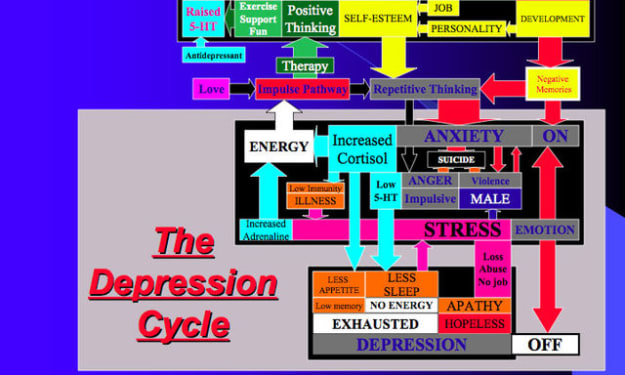Mental health is a crucial aspect of overall health
Importance of Mental Health

Mental health is a crucial aspect of overall health and well-being. It refers to a person's emotional, psychological, and social well-being, and affects how they think, feel, and behave. Good mental health allows individuals to cope with the challenges of life, build strong relationships with others, and achieve their goals. However, poor mental health can lead to a range of problems, including depression, anxiety, substance abuse, and suicide. In this article, we will explore the importance of mental health, the stigma surrounding mental health, and ways to improve mental health.
Importance of Mental Health
Mental health is just as important as physical health. Good mental health allows individuals to live a fulfilling and productive life. It helps them cope with the everyday stresses of life, build strong relationships with others, and achieve their goals. Poor mental health, on the other hand, can lead to a range of problems, including depression, anxiety, substance abuse, and suicide. Mental health problems can affect anyone, regardless of their age, gender, race, or socioeconomic status.
Stigma Surrounding Mental Health
Despite the importance of mental health, there is still a stigma surrounding mental illness. Many people still view mental illness as a weakness or a personal failing, and may be reluctant to seek help. This stigma can make it difficult for people with mental health problems to receive the support and treatment they need. It can also prevent people from seeking help when they need it, leading to a worsening of symptoms and a decrease in overall quality of life.
Ways to Improve Mental Health
There are many ways to improve mental health. Here are some tips:
Take care of your physical health: Physical health and mental health are closely related. Taking care of your physical health by exercising regularly, eating a healthy diet, and getting enough sleep can help improve your mental health.
Practice self-care: Self-care refers to activities that promote physical, emotional, and mental well-being. This can include taking time for yourself, engaging in hobbies, and practicing relaxation techniques such as meditation or deep breathing.
Build strong relationships: Social support is important for good mental health. Building strong relationships with family, friends, and others can help you feel connected and supported.
Seek help when needed: If you are experiencing symptoms of mental health problems such as depression or anxiety, it is important to seek help. This can include talking to a mental health professional, joining a support group, or reaching out to a trusted friend or family member.
Manage stress: Stress can have a negative impact on mental health. Finding healthy ways to manage stress, such as exercising, practicing relaxation techniques, or talking to a friend, can help improve mental health.
Get outside: Spending time in nature has been shown to have a positive effect on mental health. Going for a walk in the park, hiking in the mountains, or simply spending time in the backyard can help improve mood and reduce symptoms of anxiety and depression.
Practice gratitude: Practicing gratitude involves focusing on the positive aspects of life and being thankful for what you have. This can help improve mood and increase feelings of happiness and contentment.
Connect with others: Social support is important for good mental health. Connecting with others through social activities, volunteering, or joining a support group can help improve mood and reduce feelings of loneliness and isolation.
Set goals: Setting goals can help individuals feel more motivated and give them a sense of purpose. Whether it's a career goal, a personal goal, or a health goal, setting realistic and achievable goals can improve mental health and increase feelings of accomplishment.
Practice mindfulness: Mindfulness involves paying attention to the present moment without judgment. Practicing mindfulness through meditation, deep breathing, or other relaxation techniques can help reduce stress and anxiety and improve overall mental health.
It's important to note that while these tips can help improve mental health, they are not a substitute for professional help. If you are experiencing symptoms of mental health problems, it is important to seek help from a mental health professional, support group, hotline, or online resource.
Conclusion
Mental health is a crucial aspect of overall health and well-being. Good mental health allows individuals to live a fulfilling and productive life, while poor mental health can lead to a range of problems, including depression, anxiety, substance abuse, and suicide. Despite its importance, there is still a stigma surrounding mental illness that can make it difficult for people to receive the support and treatment they need. However, there are many ways to improve mental health, including taking care of your physical health, practicing self-care, building strong relationships, seeking help when needed, and managing stress. By taking steps to improve mental health, individuals can live happier, healthier lives.
About the Creator
Enjoyed the story? Support the Creator.
Subscribe for free to receive all their stories in your feed. You could also pledge your support or give them a one-off tip, letting them know you appreciate their work.





Comments
There are no comments for this story
Be the first to respond and start the conversation.